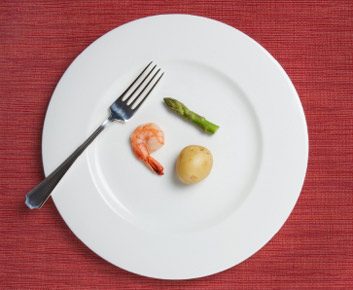
Wacky and weird diets
Infomercials, “breakthrough” diet books penned by miracle-worker doctors, supplements advertised in flyers-everywhere we turn, there’s a purported “easy” way to lose weight. Though many of these schemes will help you lose weight, that doesn’t mean they’re actually safe or healthy. (It almost goes without saying that you should run any new weight-loss regimen by a trusted health-care provider.)
These diet fads are nothing new-outrageous schemes for losing weight have long existed, some strange and some downright dangerous. Here are a few of the wackier ones from recent history.

Cabbage Soup Diet
“I have had clients come to me who have tried this diet,” says Montreal-based registered dietitian Kim Arrey The cabbage soup diet is a low-calorie eating plan that, true to its name, involves copious amounts of cabbage soup. There’s nothing suspect about the soup itself-in fact, studies suggest that eating soup before a meal will help you reduce calorie intake, says Arrey. But what makes the Cabbage Soup Diet strange is its intricate meal plan of restricted foods that are chosen for seemingly arbitrary reasons. “One woman [client] couldn’t stand the sight of tuna and beets anymore, because it was on the diet,” she says.

Prolinn Diet
In the 1970s, an osteopath by the name of Robert Linn created a diet plan that revolved around fasting and drinking his proprietary concoction of ground animal byproducts like hooves, tendons and horns. Apparently, some 2 to 4 million people tried the diet, and at least 58 suffered heart attacks while on it (though possibly from fasting as opposed to becoming ill from the drink itself), says Sander Gilman in Diets and Dieting: A cultural encyclopedia. This questionable weight-loss regime also went by the name The Last Chance Diet.

Mayo Clinic or Heart Institute or Name-Any-Clinic Diet
This diet plan masquerades under a variety of names, Arrey says, usually and falsely attributed to a famous medical clinic or hospital, such as the renowned Mayo Clinic. No matter the name, the diet plan is the same, she says. Participants eat a grapefruit half for breakfast, two hard-boiled eggs and four melba toasts for lunch, and something like two hot dogs and steamed broccoli for dinner. “You’ll be starving to death, and there’s no balance to this diet,” Arrey says. “There’s no rhyme or reason to it, either. Why hot dogs? Why only broccoli instead of another vegetable?”

Fletcherism
“Chew your food,” your mom always said, admonishing you to do so with your mouth firmly closed. At the turn of the 20th century, an American by the name of Horace Fletcher suggested followers take Mom’s advice to an extreme: Chew, chew and chew some more in order to lose weight and maintain good health. To be exact, he prescribed chewing a mouthful of food at least 32 times or until it was rendered into a liquid state. Although the precision overchewing qualifies as weird, Fletcherism, as the eating style was called, also had suggestions about nutrition that would be considered sound by today’s standards. For instance, adherents were encouraged to enjoy their food, and could eat what they wanted, but only when they were truly hungry and not merely emotional.

Tapeworm Diet
If you’re squeamish, you might not want to read about this alarming diet fad from the past. Dieters would ingest beef tapeworm cysts, and once the tapeworms reached maturity their witting hosts could purportedly lose a few pounds each week. (Do a little online searching and you’ll be treated to illustrated advertisements dating from the 1900s flogging “sanitized tapeworm” pills.) Once the desired amount of weight was shed, anti-parasitic medicine was ingested, hopefully killing off the tapeworms. Of course, the dieter would then have to excrete them, which could cause a variety of dangerous abdominal and rectal complications.

HCG Diet
“The diet I find the most bizarre is the one where they give you injections of Human Chorionic Gonadotropin (hCG) from pregnant women’s urine, and you follow a 500-calorie-a-day diet,” says Arrey. This plan gained ground in the 1970s, and is regrettably seeing renewed interest among those desperate to lose those extra pounds. Supposedly the hormone revs up the metabolism (although it is not approved by the government for this use), but realistically, the unhealthily low calorie intake means you will indeed lose weight, but not in a good or lasting way, she says. “Very few people don’t have the gumption to do this diet or any other for a few weeks, but this is not the way to go about it for a sustainable change,” Arrey says.

Vinegar Diet, Cottage Cheese Diet, Grapefruit Diet, Sweet Potato Diet…
Even if you’ve never tried these diets, you can imagine what these singular-ingredient plans entail. Eat only cottage cheese, drink vinegar before you eat, restrict yourself to sweet potatoes and presto, you’ll drop excess weight like nobody’s business. “Everything that’s new is old and is new again,” says Arrey. “Some of these that I remember from when I first started out. And, sigh, they’re back.” The bottom line, according to Arrey, is that studies show you’ll lose weight no matter whether you’re on the Grapefruit Diet or the Sweet Potato Diet. But until there’s evidence that a certain ingredient holds the magic potential to help you both lose weight and keep it off, there’s no reason to believe any of these are superior ways to slim down.
Related:
• 5 reasons most diets fail
• Do diet pills really work?
• 5 diets that don’t work
